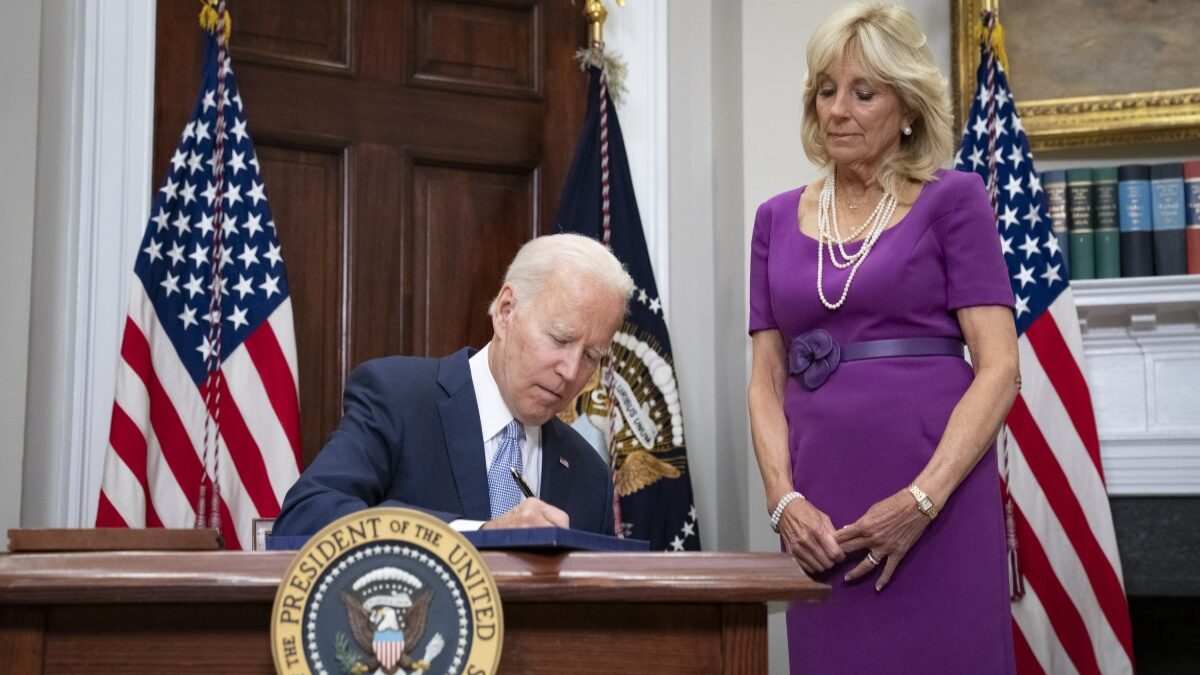That didn’t last long. Mere days after President Biden signed the (horribly misnamed) “Inflation Reduction Act” into law, his administration announced efforts that will accelerate inflation—now and in the future.
The changes to the student welfare program Biden announced—please don’t call them “loans” anymore—will increase inflation, and the federal deficit, in the short term. By encouraging universities to raise tuition further, and encouraging students not to repay their “loans,” so the federal government will provide additional cancellation in the future, his plan will accelerate an inflation spiral throughout higher education.
Higher Inflation Now
Earlier this week, the Penn-Wharton Budget Model released an analysis stating that the type of giveaway proposed by Biden would cost taxpayers at least $300 billion over 10 years. Specifically, the model estimated that providing welfare payments (i.e., “loan forgiveness”) of $10,000 to borrowers with incomes under $125,000 would cost $297.8 billion if done as a one-time event, and $329.1 billion if done on an ongoing basis for the entire 10-year budget cycle.
However, those estimates did not examine an additional $10,000 giveaway Biden announced for individuals who received Pell Grants. Given that 6 in 10 individuals with “loans” also received Pell Grants at some point, this move will likely increase the cost of Biden’s giveaway by a sizable margin, to perhaps $500 billion or more.
Either way, the spending on these giveaways would dwarf any supposed “deficit savings” coming from the legislation Biden signed into law last week. In other words, all of the audits coming as a result of the 87,000 new IRS agents this administration wants to hire will go to pay for “free” college benefits to primarily upper-class students—and then some.
Moral Hazard Later
The longer-term problem comes in the form of moral hazard, whereby market participants engage in risky behavior in the assumption that government will bail out their actions. That same phenomenon occurred after the George W. Bush administration proposed, and Congress enacted, the TARP bailout for big banks in 2008.
That moral hazard will come in a variety of forms, all of which would increase spending on higher education:
- Colleges could raise tuition by even greater amounts than in the past, believing that the federal government will eventually cancel the “loans” students take on to pay the higher fees.
- Students could well stop selecting universities based on finances, and attend more expensive universities, because they believe they will not have to pay the bill for their education. As someone who turned down the opportunity for an Ivy League education, because the Ivy League institution did not provide a generous financial aid package, I could see this scenario happening quite frequently.
- Students could decide on majors that have little value for a future career, or take on additional degrees for little professional purpose, because they don’t believe they will have to bear the financial consequences of their actions.
- Students could also decide to pay the minimum amount on their “loans,” or stop paying them altogether, in the hopes of putting additional political pressure on future Presidents to cancel their debt.
All of these scenarios will likely happen following Biden’s decision, at least to some extent. Each will increase the political pressure for additional “forgiveness,” adding to a cycle of the federal government stoking additional spending within higher education.
Of course, higher education might represent the prime exemplar of a sector of the American economy that warrants less spending, not more. Woke educators indoctrinating students with Marxist and socialist ideology helped create the movement for Biden’s “loan forgiveness” scheme.
Rather than Biden canceling student debt, Congress should instead cancel the student loan program—and make these woke educational bureaucrats earn their own keep from the private sector exclusively, rather than having students and schools receive endless bailouts courtesy of federal taxpayers.









